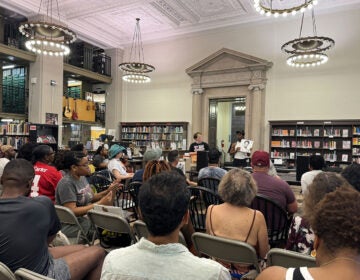Weaving the dreams of veterans with music, poetry to translate experience of war
ListenWar has always been part of our history, and stories about the war experience have populated our culture as long as we can remember.
The challenge for today’s artists is to find a way of conveying the complexity of deployment — and return — and the impact on individuals in a fresh, compelling way.
It took almost four years for jazz pianist Vijay Iyer and writer Michael Ladd to create a performance that reflects the experiences of post-9/11 soldiers.
Sleep is a rare luxury among veterans. With sleep come dreams, and dreams often take the shape of nightmares. Still, to write “Holding it Down,” librettist Ladd decided to talk to dozens of veterans and ask them only about their dreams — not their experiences, nor rank or weapons, nothing else.
“By focusing on dreams, we would both share a space shared by vets and non-veterans,” Ladd said. “We all have dreams, and in those dreams everything happens. It becomes its own dimension. Dreams also provide a very surreal landscape with no limits.” It becomes a canvas, so to speak, to weave a textured performance based on intense collaborations.
And not all the dreams were nightmares fueled by trauma, said Ladd.
“A lot of people insisted of talking about the other definition of dreams, dreams of aspiration, so that also fused into the project,” he said. To build the performance, Ladd and musician Iyer looked for the individual stories, carefully staying clear of generalizations about veterans. So they did a lot of listening.
It was not about setting stories to music, but spending time, three years in fact, with veterans of color, talking about their experiences and creating a sense of community, Iyer said. “Also, the act of making music,” added Iyer. “Building a song cycle is a therapeutic one, it’s one where you have to listen in a new way to the stories and give them the space they need — to be heard.” A musical journey
The result is the “The Veterans’ Dream Project.” For its only presentation at the Kimmel Center, the stage transformed into a dark clublike atmosphere with musicians and performers sitting on high benches.
They took turns telling their stories, led by Iyer’s driving rhythms and compositions and guided by Ladd’s dynamic libretto and his own texts. Videotaped interviews with veterans peppered the performance. Veteran Lynn Hill ends her poem “Capacity” this way: I have a capacity to remember A capacity to forget A capacity to cope To Deny To Hold It Down. Poetry and hip-hop narratives became the common language of the shared experiences because they reflect our times. In the end, it is a musical journey. Iyer and Ladd found the stories less told, less known and focused on what interested them, the experiences of people of color before and after the military. For instance, one of the veterans speaks about often identifying with the barren poor neighborhoods where families lived in Afghanistan . In his poems “On Patrol,” veteran Maurice Dacaul, one of the collaborators in the project writes:
Wake up, look down at the left boot dog tag, make sure they’re there, and jingling around your neck, black silencers wrapped in black matte electrical tape. They will help ID, the remnants of you turning to dust in the desert; stand up left foot first … “Holding it Down: The Veterans’ Dream Project” was recorded on CD in 2013, but by its own improvisational nature and the addition of Philadelphia veterans, the performance keeps changing. In the long run for Iyer and Ladd, the idea is to create a deeper conversation and a sense of community.
Yet, it’s even more than that, said Ladd.
“After every war, there’s a memory that lasts as long as the cerebral cortex keeps working in that population,” he said. “But even if the war did end, it would not end in the minds of veterans on either side of the conflict … nor would it end for those who have shared space, intimate and public space, with these veterans.
“So if we don’t find as many diverse ways to keep talking about these experiences, there’s nothing to better the situation.” And that works as much for the veterans coming home as it does for us, the people who want to bridge that civilian-military divide.
WHYY is your source for fact-based, in-depth journalism and information. As a nonprofit organization, we rely on financial support from readers like you. Please give today.














